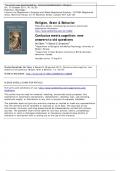This art icle was downloaded by: [ Universit et sbibliot eket i Bergen]
On: 10 Oct ober 2011, At : 02: 50
Publisher: Rout ledge
I nform a Lt d Regist ered in England and Wales Regist ered Num ber: 1072954 Regist ered
office: Mort im er House, 37- 41 Mort im er St reet , London W1T 3JH, UK
Religion, Brain & Behavior
Publicat ion det ails, including inst ruct ions f or aut hors and
subscript ion inf ormat ion:
ht t p: / / www. t andf online. com/ loi/ rrbb20
Confucius meets cognition: new
answers to old questions
a b
Rolf Reber & Edward G. Slingerland
a
Depart ment of Biological and Medical Psychology, Universit y of
Bergen, Norway
b
Depart ment of Asian St udies, Universit y of Brit ish Columbia,
Vancouver, Canada
Available online: 17 Aug 2011
To cite this article: Rolf Reber & Edward G. Slingerland (2011): Conf ucius meet s cognit ion: new
answers t o old quest ions, Religion, Brain & Behavior, 1: 2, 135-145
To link to this article: ht t p: / / dx. doi. org/ 10. 1080/ 2153599X. 2011. 598329
PLEASE SCROLL DOWN FOR ARTI CLE
Full t erm s and condit ions of use: ht t p: / / www.t andfonline.com / page/ t erm s- and-
condit ions
This art icle m ay be used for research, t eaching, and privat e st udy purposes. Any
subst ant ial or syst em at ic reproduct ion, redist ribut ion, reselling, loan, sub- licensing,
syst em at ic supply, or dist ribut ion in any form t o anyone is expressly forbidden.
The publisher does not give any warrant y express or im plied or m ake any represent at ion
t hat t he cont ent s will be com plet e or accurat e or up t o dat e. The accuracy of any
inst ruct ions, form ulae, and drug doses should be independent ly verified wit h prim ary
sources. The publisher shall not be liable for any loss, act ions, claim s, proceedings,
dem and, or cost s or dam ages what soever or howsoever caused arising direct ly or
indirect ly in connect ion wit h or arising out of t he use of t his m at erial.
, Religion, Brain & Behavior
Vol. 1, No. 2, June 2011, 135�145
Confucius meets cognition: new answers to old questions
Rolf Rebera* and Edward G. Slingerlandb
a
Department of Biological and Medical Psychology, University of Bergen, Norway; bDepartment
of Asian Studies, University of British Columbia, Vancouver, Canada
Early Chinese Confucian virtue ethics saw effortless harmony with the ‘‘Way’’ as
Downloaded by [Universitetsbiblioteket i Bergen] at 02:50 10 October 2011
essential for ethical life, but raised the problem of how one can, through effort,
reach a state of effortless perfection. We decompose this paradox into three sub-
paradoxes and review evidence from cognitive psychology relevant to each of
them. First, how can one attain spontaneity by expending effort? Second, how
can one come to love what one does not already love? Third, why is a deed
considered not virtuous if consciously done for the sake of attaining virtue? We
discuss how the cognitive sciences can contribute to potential solutions to an
ancient ethical tension, and what the humanities can contribute to problems
psychologists have only recently begun to explore.
Keywords: affect; early Chinese thought; effortless action; spontaneity;
Confucius; cognition; processing fluency; ritual; virtue ethics
Introduction
The Analects of Confucius (551�479 BCE), consisting of 20 ‘‘books’’ that purport to
record his teachings,1 is the founding text of Confucianism and arguably the most
influential book in Chinese religious thought. Confucius focused on how to become
a good person, which for him also meant becoming a good servant of the state.
Confucius believed that, in order to attain moral perfection, it was necessary for the
aspiring ‘‘gentleman’’ to reach a state of wuwei or ‘‘effortless action,’’ where proper
actions would be performed unselfconsciously and without a sense of effort. In early
Confucian thought, this sort of effortless virtuous action is portrayed as the result of
extended training in traditional cultural forms, including rituals and music, and
repeated oral and mental rehearsals of moral exemplary narratives and maxims. The
Analects (Slingerland, 2003b), along with other major works of Chinese thought,
became the basis of China’s civil service examination, and they were therefore
memorized by every educated Chinese person from 1313 until the last nationwide
exam in 1910.
In this paper we intend to focus on a particular paradox that plagued early
Confucian thought, and that also seems endemic to any system of moral education
that values spontaneity: fundamentally, the problem of how one can try not to try.
We will explain how this paradox can be decomposed into three separate sub-
paradoxes, and we will then discuss evidence from contemporary cognitive
psychology that is relevant to each of them.
*Corresponding author. Email: rolf.reber@psysp.uib.no
ISSN 2153-599X print/ISSN 2153-5981 online
# 2011 Taylor & Francis
http://dx.doi.org/10.1080/2153599X.2011.598329
http://www.tandfonline.com




